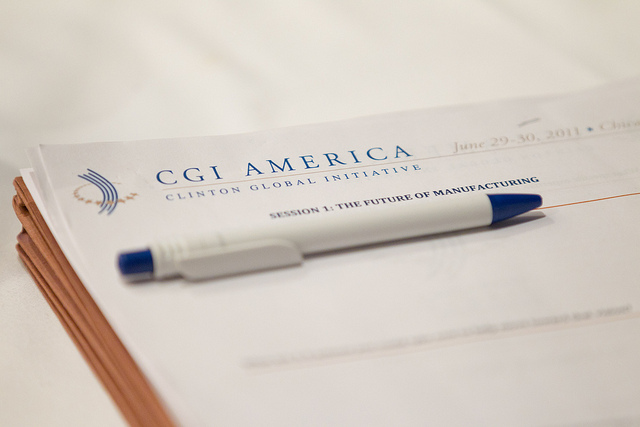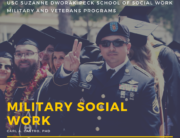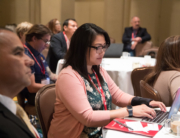Anthony Hassan, director of the Center for Innovation and Research on Veterans and Military Families (CIR) at the USC School of Social Work, recently attended the Clinton Global Initiative America jobs summit, a meeting hosted by former President Bill Clinton on driving job creation and economic growth in the United States.
More than 750 business, nonprofit and government leaders attended the two-day event in Chicago, participating in one of the 10 working groups to brainstorm new ideas for generating jobs, identify effective ways to strengthen U.S. industries, unlock capital for innovation and entrepreneurship, advance energy efficiency, build clean energy infrastructure, and train Americans for the 21st-century workforce.
Hassan was a member of the Veterans Working Group, which addressed the soaring unemployment rate among veterans and developed strategies to lower unemployment among new veterans by educating employers and equipping veterans with critical tools for success.
“Veterans often experience culture shock when they return to their civilian lives and may need assistance navigating community resources for transitioning back into the civilian workforce,” Hassan said. “They often find that civilian employers don’t understand how their military skills translate to a civilian job, and some veterans will face the stigma associated with post-traumatic stress disorder (PTSD) and other mental health challenges,” Hassan said.
The Veterans Working Group discussed developing more robust networking and mentorship opportunities for new veterans to improve the post-service transition process, addressing veterans as valuable additions for employers rather than liabilities, and increasing awareness of support services available to both veterans and employers to improve veterans hiring initiatives. In addition, the group identified ways to prepare veterans for the civilian workforce and highlighted successful examples of veteran-launched advocacy organizations, nonprofits and small businesses as ways to inspire entrepreneurship among new veterans.
The group also detailed the need to consolidate the information and resources necessary for veterans to start a business and outlined an initiative to elicit commitments from Fortune 500 companies and their sub-contractors to hire veterans.
The Clinton Global Initiative encourages organizations and businesses to implement concrete plans to address challenges in their communities. These “commitments to action” tackle specific problems through explicit and measurable actions. CIR made a “commitment to action” to help address the shortage of behavioral healthcare providers currently available to effectively treat servicemembers, veterans and their families by rapidly increasing the capacity and competence of professionals to meet these needs.
CIR’s “Building Capacity in Behavioral Healthcare for Veterans” initiative will provide free training to a number of healthcare providers through its on-ground and online military behavioral health continuing education series over the next year. Many providers are eager to educate themselves on how to more effectively treat veteran clients and their families, but lack the means to pay for further training. CIR’s commitment to offer training at no cost is designed to quickly boost the number of mental health professionals who are prepared to effectively treat behavioral health challenges among military-impacted populations.
CIR began offering the series this spring through a pilot program, which is now being converted to a web-based format. The next series of continuing education courses will begin this fall at CIR in downtown Los Angeles. For more information, please email .
Photo credit: Todd Rosenberg / Clinton Global Initiative








